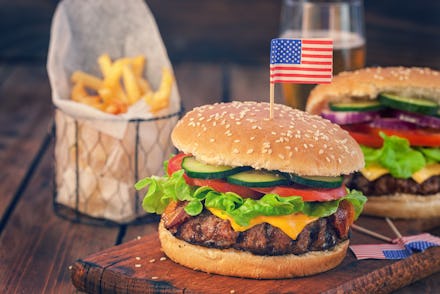The non-American history of 4 quintessentially American foods

Independence Day in America is a celebration of freedom from work, school and other responsibilities — and most of us observe our nation's independence by throwing meats on a grill and sipping on ice cold beers.
But some of the foods we love to eat didn't actually originate here. The traditional foods we associate with this summer holiday were often invented by other cultures or brought here by immigrants. From hot dogs to apple pie, some "American" foods we love aren't American at all.
Hot dogs
Hot dogs evolved from sausages, which were first invented by the Romans. A cook for the Roman emperor Nero decided to stuff pig intestines with ground meats and spices after discovering a pig's empty intestine had puffed up when the pig was roasted, according to the History Channel. The Germans took this idea and ran with it, creating many types of sausage. The "frankfurter," or the modern hot dog, is thought to have originated in 1484 in the town of Frankfurt.
Americans embraced the hot dog after German immigrants brought it to their new homeland. But it was a Polish man who really catapulted the hot dog to stardom. Nathan Handwerker worked at a hot-dog stand on Coney Island until he saved enough money to open his own stand. He was so successful that his brand, "Nathan's Famous," drove competitors — including his former boss — out of business and became one of the most recognizable hot dog brands in the U.S.
Burgers
Ground beef has been a popular food since long before the 13 colonies were established. Serious Eats reported the humble sandwich has origins in the 13th century, when Mongols put raw beef under their saddles to make it more tender before eating it raw.
A more modern (and cooked) iteration of the hamburger showed up in Germany when Russians, who had been eating steak tartare descended from the Mongols' saddle meat, brought their beef to Hamburg. In the 18th and 19th centuries, food stands in New York City began cooking Hamburg-style steaks to cater to German immigrants and sailors.
Americans, however, do get credit for putting the ground beef patty between buns: At least three people in the U.S. claim to have independently pioneered the burger. But we have German immigrants to thank for helping with this invention — and that's why the name still pays tribute to them today.
French fries
The average Americans eats 29 pounds of French fries per year. But French fries aren't French, and they aren't American, either. The idea to fry up spuds first came from Belgium. After realizing thin strips of potatoes could mimic fried fish, Belgians began frying potatoes instead of fish when rivers froze over during 19th-century winters.
In 1802, Thomas Jefferson enjoyed the tasty fried potatoes served by his French chef, Honoré Julien. But it wasn't until around 1930 that Americans began calling them "French fries." Diners and fast-food joints relied on frozen fries to fuel hungry customers, cementing the French fry's status as a bona fide American staple.
Apple pie
The first pies were made by ancient Egyptians — and the first pie recipe, a rye-crusted goat cheese and honey pie, was made by the Romans, according to the American Pie Council. In 1381, the first recipe for apple pie was published in an English cookbook.
So, how did the pastry get equated with American patriotism? Apple pie was associated with patriotism during World War II, when the idea of fighting "for mom and apple pie" spread as a sort of slogan among American soldiers, Mic previously reported.